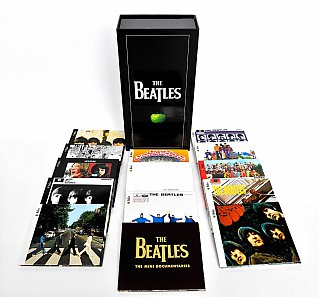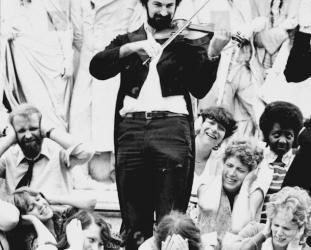Graham Reid | | 4 min read

A familiar Beatles’ song from a lifetime ago comes from the speakers then, after little more than 30 seconds, is faded. It begins again, but now there’s an energy and freshness about it, the vocals crisp and lively, the guitars and drums having a thrilling immediacy.
“It’s as if a layer of grime has been removed, isn‘t it?” says longtime Abbey Road studio engineer Allan Rouse with a smile of satisfaction.
He then plays another track . . . and another, each time offering by way of comparison the version of the song on the currently available CDs with these newly polished treatments.
Twist and Shout, Can’t Buy Me Love and Eight Days a Week fly by — songs so recognizable you’d think there was nothing more to be discovered in them. But each remastered version springs to life with compelling vitality.
Then it gets serious in the London studios where the Beatles recorded over 200 songs between June ‘62 and late ’69.
These first examples of the remastered Beatles catalogue released on September 9 — 09/09/09 or “number nine, number nine, number nine” as in the Beatles’ sound collage Revolution 9 — have just been in mono.
Now engineers Rouse and Steve Rooke, who spent a year remastering every Beatles album, play some one-upmanship with the stereo remasters: John Lennon’s throwaway on the Yellow Submarine soundtrack Hey Bulldog explodes with a power that is life-threatening; the strings on The Long and Winding Road are swelling and heroic; the guitars on George Harrison’s I Need You from the Help! soundtrack (another minor work in the Beatles canon) sting and chime . . .
And we haven’t even got to the most psychedelic and sonically interesting Beatles’ songs: Strawberry Fields Forever, I Am The Walrus, A Day in the Life . . .
It is one of the ironies of popular music that the Beatles catalogue, the most influential and innovative in pop and rock, has been so ill-served by the developing technology since their demise in 1970.
Their albums were given cursory CD release in ‘87 with nothing by way of liner notes or sonic enhancement. In subsequent years a few albums — such as The Beatles double disc from ‘68 which came as a limited edition 30th anniversary edition — were revisited. But the music always lacked the spark which remastering, afforded to their Sixties peers and most major bands since, could bring.
Remastering means recording engineers go to the original master tapes as source material. This isn’t remixing which involves changing the placement of the sound to present a different version of the original. A remastering is more a polish and shine of individual elements but which leaves the music itself intact.
The remastered Beatles catalogue — 14 albums which includes the Magical Mystery Tour album and the double-disc compilation Past Masters — now lets an audience hear this music much as the Beatles and their producer Sir George Martin (like Paul McCartney, knighted for his work) once heard it.
For Rooke and Rouse — who have worked on Beatle music for almost two decades so forgivably have no Beatles on their iPods — the long-overdue remastering of this historic catalogue took a year. For three years prior to that however — while working on other Beatle-related projects, among them the Love remix album and McCartney’s revision of Let It Be — they were “auditioning equipment”, locating the original sound desks and equipment, and in constant discussions about the parameters of the project.
“We agreed to remove pops, sibilants, some tape noise and electrical clicks which weren’t part of the performance,” says Rouse. Wiping tape noise completely would removed sonority and spirit from the performances however.
“We decided we wouldn’t remove Ringo’s squeaking bass pedal or the squeaky piano chair because they were in the character of the music. A couple of poor edits were cleaned up, there was a little more treble to bring the voices out.”
Now these cornerstone albums — from Please Please Me, With the Beatles and A Hard Day’s Night which captured the zeitgeist of carefree Beatlemania to Abbey Road and Let It Be a mere five years later — are not only remastered but handsomely repackaged.
They come in eco-friendly Digipaks with gatefold sleeves, liner notes by Mike Heatley (“another Beatles’ Anorak,” laughs Rouse), photographs and — for an unspecified “limited period” — each has a short QuickTime film about the album by Bob Smeaton who was series director and writer on the Beatles’ Anthology documentary.
Single albums will retail around $30, double albums (The Beatles, Past Masters) about $50. The stereo box set will be more than $400, the limited edition (10,000 copies) of mono mixes close to $500.
There is an irony here: EMI is releasing scrupulously remastered material from the most important catalogue in pop-rock at a time when many listen on iPods or laptops where sound is compressed. People burn second and third generation music onto cheap CDs, and the best sound system many have is in their car. A lot of people don’t care about clarity of sound.
There’s a further irony: this remastering was completed four years ago and its release now comes because of a technology the Beatles could never have envisioned: the interactive Beatles Rock Band game (compatible with Guitar Hero and Sing Star) in which you can play along to 45 of the remastered tracks with detailed, animated images of the Beatles.
The music clips are divided into four sections: the early years; the first American tour; the studio and psychedelic years; and the 1969 rooftop concert in London.For the Shea Stadium concert in ’65 the animated Beatles run to the stage and as they start to play — as the gamer does too — there is built-in audience approval by way of screams and shouts.
The animation is state-of-the-art and clever: there is a pastoral look to Here Comes the Sun as hippie-era Beatles lounge on a sun-bathed hillside, you are there on the windblown rooftop in London when the Beatles played to a live audience for the last time.
Beatles Rock Band — simultaneously released with the albums — may kick-start interest in Beatles music for a new generation. McCartney and Ringo Starr (in the pantheon of great rock drummers on the sonically improved evidence of the albums), and the estates of Lennon and Harrison, will probably make more from the game than the remastered albums.
For those who have had the Beatles as the soundtrack to their lives, there is understandable scepticism: what can you possibly discover in this music that you haven’t before?
The answer is a frisson of excitement as much as previously unheard musical detail.
There is another, indefinable, factor: today the Beatles are a cultural touchstone, emblematic of the changing times of the distant Sixties. Their music is acclaimed and analysed, but diminished and distilled in the public imagination to a handful of songs on radio.
Their increasingly innovative music in Abbey Road has come to mean less than what the Beatles stood for.
The remastered catalogue — perhaps the last great hurrah for the physical format of CDs given these songs aren’t legally available on-line — allows the Beatles’ music, with exceptional clarity and presence, to take centre-stage once more.
And after all these years, decades even, it sounds remarkable.





post a comment